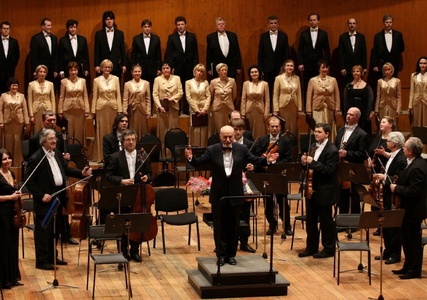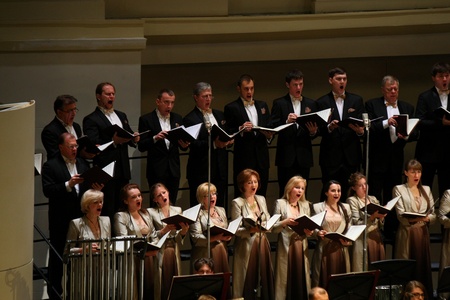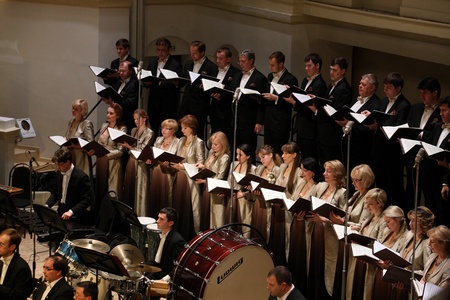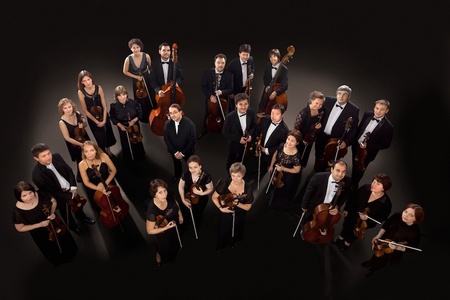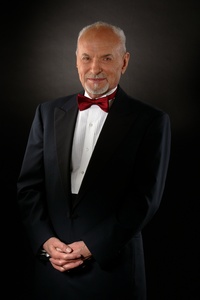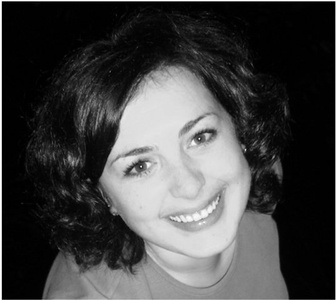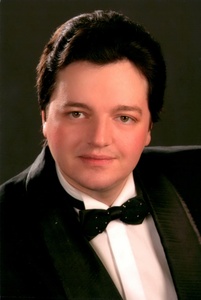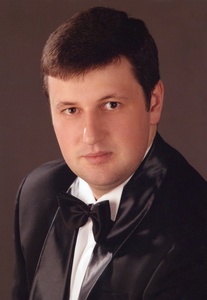Dedication to W. A. Mozart
(260 anniversary of birthday)
November 24, 2015
Tchaikovsky Concert Hall
directions to the hallMoscow Chamber Choir
Musica Viva Chamber Orchestra
Vladimir Minin, conductor
Evgeniya Sorokina (soprano)
Alina Yarovaya (soprano)
Dariya Knyazeva (mezzo-soprano, Ukraine)
Nikolay Shulyak (tenor, Ukraine)
Sergey Kovnir (bass, Ukraine)
Program:
Mozart
Requiem for Soloists, Choir and Orchestra
"Exsultate, Jubilate" — motet for Soprano and Orchestra
Ave verum corpus — motet for Choir and Orchestra

Subscription №40:
Moscow State Academic Chamber Choir
Moscow Chamber Choir
The Moscow State Academic Chamber Choir was founded in 1972 by Artistic Manager and Chief Conductor, People’s Artist of the USSR, USSR State Prize Laureate, Professor Vladimir Minin who is at the head of the Choir up till now.
The Choir was born as antipode to official formal execution. There created a group capable to be collective “EGO” in its intercourse with audience, that is able to talk as outstanding personality while recounting about own feelings, events endured by the People, about its dreams and ideals, about concealed and significant matters.
Absolute feeling of harmony and dynamism of the modern world are peculiar to artistic temper of the Group.
World-wide known singers—Obraztcova, Arkhipova, Vedernikov, Sotkilava, Nesterenko appear with the Choir. The best Russian conductors—Fedoseyev, Spivakov, Pletnev, Sondetckys perform with the Group.
There are no composers in Russian choral music whose things wouldn’t be performed by the Choir. The repertoire of the Choir is very diverse. It consists of Russian classic music things (Rakhmaninov, Tchaikovskiy, Musorgskiy), Western-European classic (Bach, Mozart, Brams, Vivaldy), Russian folklore. Except a’capella things the Choir performs big-form works with an orchestra accompaniment as well as takes part in the opera productions—“Masked-Ball” by Verdy, “Iolanta” by Tchaikovskiy, “Bohemia” by Putchinni.
The spirit of the Group is not only in original and irreproachable manner of execution but also in fact that this particular Choir was the first during “the great stagnation” period revived the music of “prohibited composers” such as Chesnokov, Strumskiy, Grechaninov. The touring route of the Group ran through many countries and continents. Only for the last past years the Choir went on a tour to the USA, Switzerland (Zurich, Berne, Basel, Lucerne), Austria (Vena, Bregentze), Germany (Berlin, Kassel, Munich, Frankfurt, Potsdam), China (Pekin, Shanghai), Japan, Brazil, Portugal, Argentina, Italy.
For the time of creative work the Group was awarded many prizes including the title “Academic”. In 1999 Moscow and All Rus’ Patriarch Alexiy II for great creative merits and highest spirituality awarded V.N.Minin in honor of his 70th anniversary with sculpture of Holy Grand Duke Vladimir.
For the past years the Choir recorded 8 compact disks at such big Recording Companies as “Deutche Gramophone”, “Mazur Media”, “Eurodisk”, “Melodia”, and English Company NVC issued video cassettes with recording of Russian Church Music in the execution of The Moscow State Academic Chamber Choir.
Musica Viva Chamber Orchestra
Musica Viva's origins go back to 1978, when violinist and conductor Viktor Kornachev founded a musical ensemble of nine players – all young and enthusiastic, and recent graduates of Moscow's musical academies. By 1988 the ensemble had grown into a full-fledged orchestra, now led Alexander Rudin who also gave the group its name, Musica Viva. Under his guidance, the orchestra achieved the pinnacles of artistic endeavour, and ranked along Russia's finest orchestras.
Musica Viva today is an all-round musical ensemble which performs the widest possible range of compositions in all styles and genres with an assured confidence. The highlight of the orchestra's projects has been the cycle named Masterpieces & Premieres at the Moscow Philharmonic Society, featuring musical masterworks in their original splendour alongside musical rarities which are brought once more back to the concert platform. 2011 marked the creation of the Silver Classics series consisting of works that are not part of the so called ‘golden repertoire’ while deserving indeed to be there. The series includes a Young Artists Programme introducing prize-winners of European music competitions to the audience, as well as annual Cello Assemblies to which maestro Rudin invites his fellow cellists.
The performance of neglected masterworks forms a major part of the orchestra's repertoire. Musica Viva has given the first Russian performances of works by C. F. E. Bach, Cimarosa, Dittersdorf, Dussek, Pleyel, Tricklir, Volkmann, Kozlovsky, Fomin, Vielgorsky, Alyabyev, Degtyarev, and many others. The orchestra also makes the audience discover leading contemporary works, with world and Russian premieres of music by Artyomov, Pärt, A. Sallinen, Silvestrov, Manotskov, Akhunov, Andrei Golovin, and other composers.
Over the last decade, Musica Viva has been increasingly involved in large-scale projects including concert performances of operas and oratorios. Under the baton of Alexander Rudin, the orchestra has performed Haydn’s The Creation and The Seasons; Mozart's Idomeneo, Weber's Oberon, Beethoven's Fidelio, Schumann's Requiem, Vivaldi's Juditha Triumphans, and Degtyarev's Minin & Pozharsky, or Liberation of Moscow. The musicians presented the Russian premieres of Handel's cantata Apollo e Daphne and operatic serenata Aci. Galatea e Polifemo, and of Hasse's serenata Marc Antonio e Cleopatra and oratorio I Pellegrini al Sepolcro di Nostro Signore. In collaboration with the British maestro Christopher Moulds the orchestra has given the Russian premieres of Handel's operas Orlando and Ariodante, as well as his oratorio Hercules.
Musica Viva regularly invites musicians of world status to join its performances. These have included Christopher Hogwood, Sir Roger Norrington, Vladimir Jurowsky, Andraš Adorian. Robert Levin, Andreas Staier, Eliso Virsaladze, Natalya Gutman, Ivan Monighetti, Nikolai Lugansky, Boris Berezovsky, Alexei Lubimov, Giuliano Carmingola, Isabelle Faust, Roel Dieltiens, Thomas Zettmaier, Christian Tetzlaff , Shlomo Mintz, and leading operatic prima donnas Joyce di Donato, Annick Massis, Vivica Genaux. Deborah York, Susan Graham, Malena Ernman, Stéphanie d’Oustrac, Hibla Gerzmava, and Julia Lezhneva. World-famous choirs including Collegium Vocale Gent and Latvia, as well as the Russian vocal ensemble Intrada, have also appeared with the orchestra.
Musica Viva makes continuous appearances at major international music festivals including world-renowned La folle journee taking place in France, Spain, Japan, Poland, and Russia (Yekaterinburg). The orchestra has toured to Germany, France, the Netherlands, Italy, Spain, Belgium, Japan, Czechia, Slovenia, Poland, Finland, Turkey, India, and Taiwan, while giving regular concerts in many Russian cities.
The orchestra has recorded over 20 albums for such labels as Russky Sezon, Olympia, Hyperion, Naxos, Chandos, Тudor, Fuga Libera, and Melodiya, among others. Symphonies by Johann Stamitz were released in 2019, while Beethoven's Triple and Violin Concertos with Dmitry Sinkovsky (violin), Alexei Lyubimov (historical piano) and Alexander Rudin (cello, conductor) appeared in 2020. Recordings with maestro Rudin as a soloist are of particular interest and include cello concerts by Tricklir, Myaskovsky, Antonin Kraft, and baroque composers, such as Hasse, C. P. E. Bach, Hertel etc. The Grieg Album introduces Alexander Rudin a master of orchestration, featuring his orchestral versions of chamber works by the Norwegian composer.
In the 2028/19 season, Musica Viva celebrated its 40th anniversary. Over many years, the orchestra’s activity has been supported by a grant of the Russian President.
Vladimir Minin
The artistic director and the main conductor of
the Moscow State Chamber Choir — National Artist of the USSR, the winner of the
State premium, Professor Vladimir Minin is one of the brightest musicians of
our country. He is invited by both Russian and foreign collectives for
preparation of the programs and realisation of “the foreman of classes.”
Vladimir Minin was born on January 10, 1929 in Leningrad. He graduated from the Leningrad choral school and in 1945 has got in the Moscow Conservatoire, where his creative activity has began in 1949, when A.V.Sveshnikov has invited Vladimir as a choirmaster in the State Academic Russian choir.
In January 1951 Vladimir Minin was nominated the artistic director and the main conductor of the Ensemble of songs and dances of the Soviet army in Poland, and in 1954 has got in the post graduate program of the Moscow Conservatoire.
From 1958 to 1963 V.Minin was the director of the State capella of Moldova “Doyna” and from 1965 to 1967 he was the artistic director and the main conductor of the Leningrad academic Russian choral “Glinka capella”.
In 1972 under Vladimir Minin’s initiative, working in that time as the rector of State musical-pedagogical Gnesin's institute, from the students and high school teachers was created a chamber choir, transformed in 1973 into a professional collective—the Moscow State Chamber Choir.
This is when his rare artistic gift with the special brightness and completeness was revealed. For rather short period of time, the Moscow Chamber Choir became one of conducting art collectives of the country.
The power of the genuine art under a person is boundless. Really funny makes you to laugh, authentic grief—to cry, resolution—to act, the truth—to believe. The genuine art ennobles a man, and it is impossible to oppose to such strength. Everybody who used to visit concerts of E.Mravinskiy, S.Rikchter is familiar with a sensation (feeling) when incomprehensible becomes clear, the mysterious appears, and you begin to feel yourself as a sounding and significant part (fraction) of the lofty and wise world harmony, when spirit of goodness is set in the hall and there arises the most important that the art may give—the brotherhood effect.
Exactly such atmosphere reigns at the concerts of V.Minin’s Choir. It is this particular aura which is necessary for life of the Group and its’ Conductor. They create such aura by their creative work. And the good arises the good.
Vladimir Minin is really Russian creator. The main in his creative work is ethic principle. He is the prominent creator who wields with the traditional instrument of his profession perfectly but also possesses with lots of secrets of his craft. For that in home press he is called “magician”, “wizard”, “sorcerer”. Creator stunning with breadth of sound recording, who has already invented a lot of unprecedented things, he never the less is always in the process of permanent search.
Vladimir Minin whatever he executed—from Monterverdy to Gershvin and Ravel, from famous singings to Stravinskiy and Sviridov—he never regards as of paramount importance the incredible technical mastership of his Group although such mastership by itself would constituted name and fame of its’ leader.
Paraphrasing the expression of famous Russian scientist one may say that Minin works for art and creates for people. His delicate intuition, feeling of epoch, style, temperament, indefatigable imagination, knowledge, culture—everything is given up to search of truth and goodness, to cognition of harmony. Namely such search for Russian painters was and remains the principal vital task. And Vladimir Minin settles the matter without trying to adjust the correct answer.
He is not only the choir master but also the pedagogical innovator whose training system is grounded on paradoxical for the Choir foundation—entire individual freedom of singing voice. Undoubtedly there will be written theoretical research on this subject and practical results could be seen already.
Chamber Choir—is a Group of Soloists, at that some of them transform to bright individuals. There is no stiffness, artificiality in sound—making that is so peculiar to most academic choruses. There is artistry, lightness, simplicity and there seems absolute unavailability of obstacles in overcoming the difficulties both proposed by a composer and brought forward by the Maestro. Somewhere in perspective one may dream about Choral Theater, birth of new genres and forms of choral musicmaking.
Minin’s Choir—is lively and militant art, new and strong sucker of life-tree capable to hold out in any fights for the right to serve people. And it is a great occasion for everybody who is in a position to appreciate the excellence to know about availability of such strength in our musical art. And Minin may also appreciate the excellence. That is why he and like-minded persons are in the state of permanent work. Plans, search, and tireless toil—today, tomorrow, always and up to exhaustion.

